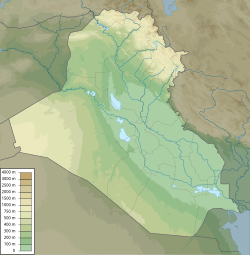
The Iraqi Republican Guard was a branch of the Iraqi military from 1969 to 2003, which existed primarily during the presidency of Saddam Hussein. It later became known as the Republican Guard Corps, and then the Republican Guard Forces Command (RGFC) with its expansion into two corps. The Republican Guard was disbanded in 2003 after the invasion of Iraq by a U.S.-led international coalition.
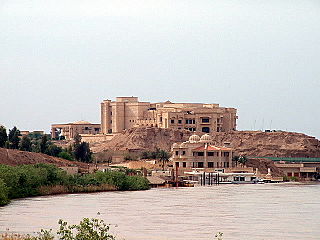
Tikrit is a city in Iraq, located 140 kilometers (87 mi) northwest of Baghdad and 220 kilometers (140 mi) southeast of Mosul on the Tigris River. It is the administrative center of the Saladin Governorate. As of 2012, it had a population of approximately 160,000.
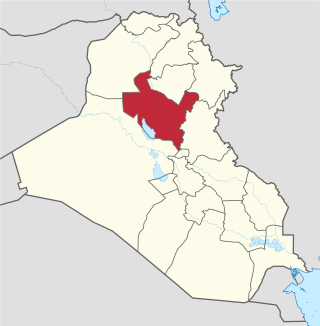
The Saladin, Salah ad Din, or Salah Al-Din Governorate is one of Iraq's 19 governorates, north of Baghdad. It has an area of 24,363 square kilometres (9,407 sq mi), with an estimated population of 1,042,200 people in 2003. It is made up of 8 districts, with the capital being Tikrit. Before 1976 the governorate was part of Baghdad Governorate.

Sadr City, formerly known as Al-Thawra and Saddam City, is a suburb district of the city of Baghdad, Iraq. It was built in 1959 by Prime Minister Abdul Karim Qassim and named Al-Rafidain District. After the US-led invasion of Iraq and the toppling of Saddam, it was unofficially renamed Sadr City after Ayatollah Muhammad al-Sadr.

Izzat Ibrahim al-Douri was an Iraqi politician and army field marshal. He served as Vice Chairman of the Iraqi Revolutionary Command Council until the 2003 U.S. invasion of Iraq and was regarded as the closest advisor and deputy under President Saddam Hussein. He led the Iraqi resistance group Naqshbandi Army.

Baiji is a city of about 173,677 inhabitants in Salah ad Din governorate in northern Iraq. It is located some 130 miles north of Baghdad, on the main road to Mosul. It is a major industrial centre best known for its oil refinery, the biggest in Iraq, and has a large power plant. With regards to transport in the area, Baiji is a junction of the national railway network.

The 4th Infantry Division is a division of the United States Army based at Fort Carson, Colorado. It is composed of a division headquarters battalion, three brigade combat teams, a combat aviation brigade, a division sustainment brigade, and a division artillery.

In military slang, a spider hole is a type of camouflaged one-man foxhole, similar to a surveillance/hidesite used for observation.
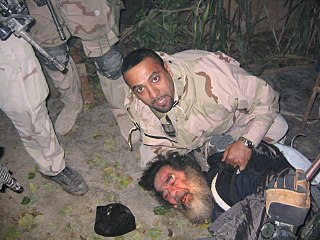
Saddam Hussein, the deposed president of Iraq, was captured by the United States military in the town of Ad-Dawr, Iraq on 13 December 2003. Codenamed Operation Red Dawn, this military operation was named after the 1984 American film Red Dawn.
Al-Awja is a village 8 miles (13 km) south of Tikrit, Iraq on the western bank of the Tigris. It is mainly inhabited by Sunni Arabs.

Amarah, also spelled Amara, is a city in south-eastern Iraq, located on a low ridge next to the Tigris River waterway south of Baghdad about 50 km from the border with Iran. It lies at the northern tip of the marshlands between the Tigris and Euphrates.
During Operation Iraqi Freedom, Operation Planet X was a US Army mechanized raid conducted on a village near Ad-Dawr in Salah Al-Din province 11 miles (18 km) north of Tikrit on the night of 15 May 2003 by elements of the 1st Brigade Combat Team, U.S. 4th Infantry Division and Task Force Ironhorse in search of Ba'ath party members and militants.

Forward Operating Base Danger was a forward operating base operated by the United States Army in Tikrit, Iraq from the time of the occupation of Iraq in 2003 until November 2005 when it was handed over to the government of Iraq.
FOB Paliwoda or Camp Paliwoda was a US forward operating base (FOB) in Balad, Iraq. The base was named for Captain Eric Paliwoda, an Engineer Officer and West Point Graduate from Farmington, Connecticut serving with the 3rd Brigade Combat Team, 4th Infantry Division, who was killed in an enemy mortar attack in Balad on 2 January 2004; it had formerly been called FOB Eagle.

The Army of the Men of the Naqshbandi Order, also known as the Naqshbandi Army, is one of a number of underground Ba'athist militant insurgency groups fighting U.S.-led Coalition forces in Iraq. Media frequently refers to the group by the initials JRTN, a romanization of its Arabic name. Supreme Command for Jihad and Liberation, technically the name of the umbrella organization to which JRTN belongs, is also often used to refer to JRTN specifically.
The 42nd Field Artillery Regiment is a field artillery regiment of the United States Army, first constituted 5 July 1918 in the National Army. The 4th Battalion was nicknamed the Straight Arrows. The Regimental motto is Festina Lente.

The Arab Socialist Ba'ath Party – Iraq Region, officially the Iraqi Regional Branch, is an Iraqi Ba'athist political party founded in 1951 by Fuad al-Rikabi. It was the Iraqi regional branch of the original Ba'ath Party, before changing its allegiance to the Iraqi-dominated Ba'ath movement following the 1966 split within the original party. The party was officially banned following the American invasion of Iraq in 2003, but despite this it still continues to function underground.
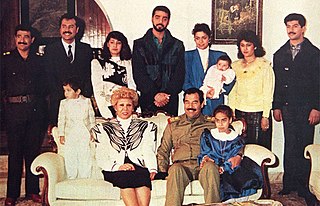
The Tulfah family was the family of Saddam Hussein of Ba'athist Iraq who ruled from 1979 to 2003 and established a single party authoritarian government under the control of the Ba'ath Party until the 2003 invasion of Iraq.

Saber Abdel Aziz al-Douri is a former Iraqi politician, intelligence officer and Governor of Bagdad.
Douri, Al-Douri or Ad-Douri is an Arabic-based surname, derived from the name of the Iraqi town Ad-Dawr. Douri may refer to:
